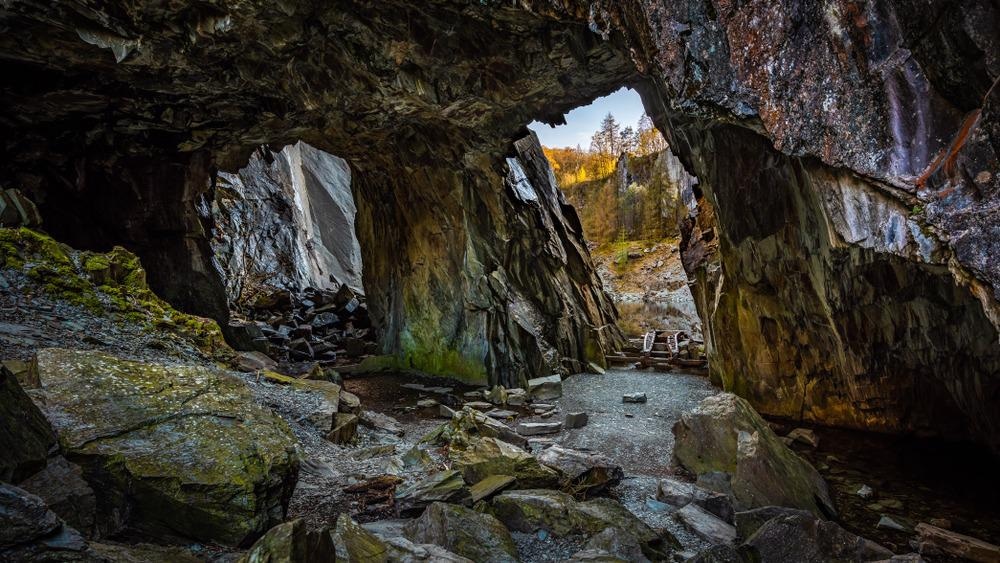A zero-carbon economy is one where a balance of zero carbon emissions is achieved. This can be from reducing the emissions released into the atmosphere from human activity or from mitigating the impact of carbon-emitting industries by removing carbon from the atmosphere either by natural solutions (such as planting trees) or via innovative technologies (e.g. direct air carbon capture and storage [DACCS] technology). Establishing zero-carbon economies, or ‘carbon neutral’ economies, are vital to achieving the goals of the Paris Agreement.

The mining industry accounts for 2-3% of carbon emissions and is under increasing pressure to reach carbon neutrality. Image Credit: mountaintreks/Shutterstock.com
Signed in 2015 by 197 parties, the Paris Agreement sets to limit the rise of global average temperatures to a maximum of 2 °C but ideally 1.5 °C by 2050. To achieve this, carbon emissions associated with human activity would need to fall by 45% over the next decade to reach carbon neutrality by 2050.
The Mining Industry is a Significant Contributor to Carbon Emissions
The mining industry is currently considered to be a significant contributor to global carbon emissions, accounting for 2-3% of these emissions. As a result, the industry finds itself under increasing pressure from all stakeholders, regulators, investors, and customers to shift to zero-carbon mining.
Fortunately, much research is underway that focuses on developing strategies to reduce or offset mining emissions. Here, we discuss those options, with a focus on the UK mining industry.
Opportunities to Reduce UK Mining Industry Emissions
Since the 1980s, the UK has been dramatically reducing its mining operations leading to it ending deep coal production in 2016 and leaving just 13 working coal mines left open in the country in 2019. Phasing out coal mining is one of the UK’s strategic tools to reach carbon neutrality by 2050. For the mines that are left, the country recognizes that tactics must be employed to reduce their emissions.
The emissions associated with mining operations can be classified as scope 1 emissions (from diesel), scope 2 emissions (from electricity generation), and scope 3 emissions (from the supply chain and transport). Efforts are needed to reduce all three categories of emissions sources to achieve decarbonization of the industry.
Improving the operational efficiency of the mine is a strategy that addresses scope 1 and 2 emissions. This can be achieved via investment into upgrading operational processes so that they are more energy-efficient. Therefore, less energy is expended, and fewer emissions are produced due to this drop in energy use.
Mines can also switch to using sustainable fuels to power equipment and transportation. This strategy addresses scope 1 and 2 emissions. Research has shown that the use of sustainable fuels has the power to reduce carbon emissions by 70% or more.
The establishment of sustainable drive trains is vital to achieving carbon neutrality and addressing scope 1 and 2 emissions. Switching to battery electric vehicles (BEVs) is an example of a long-term option for reducing emissions associated with this area of mining.
The use of green electricity to power operations is another tactic to reduce scope 2 emissions. Switching to green energy sources has the power to reduce 30-50% of scope 2 emissions, dramatically impacting the emissions of mining operations and helping it to reach carbon neutrality.
Sustainable sourcing is a common strategy employed to address scope 3 emissions of mining operations. Efforts to move the entire supply chain towards clean, environmentally friendly operations is not a simple feat, but it is vital to ensure the future sustainability of the industry.
Reaching Carbon Neutrality in the Mining Industry
The UK is adopting additional strategies to help reach carbon neutrality. Tungsten West’s new mine in Plymouth will play a vital role in the country’s move towards net-zero carbon emissions. The mine will be important to supporting the UK’s adoption of electric vehicles, with the excavated tungsten contributing to the production of new electric batteries that are fundamental to powering these vehicles.
Other strategies involve the renovation of the UK’s many abandoned mines into green energy projects. The UK was once home to a thriving mining industry but the environmental impact and danger to workers have resulted in the closure of most mines. It is estimated that roughly 14% of the UK’s land sits above a coalfield. In recent years, researchers and engineers have questioned whether these vast numbers of disused mines could be used in generating renewable energy. The fact that mines are home to great volumes of water that are heated via geological processes as warm as 40 ˚C lends them to renewable energy production purposes.
Scientists have discovered that renewable energy can be generated by sinking a borehole into the mine and pumping out the warm water to the surface. Here, it is fed into a heat exchanger or heat pump where the water’s warmth provides heat by circulating a district heating system.
Currently, the country has over 30 projects underway that aim to use old mines to access renewable, geothermal energy. Such projects could be significant to providing the UK with a reliable renewable energy source.
References and Further Reading
Georgina Kyriacou and Josh Burke. (2021) Why is ‘net-zero’ so important in the fight against climate change? [Online]. London School of Economics. Available at: https://www.lse.ac.uk/granthaminstitute/explainers/why-is-net-zero-so-important-in-the-fight-against-climate-change/
Henry Legge, Clemens Müller-Falcke, Tomas Nauclér, and Erik Östgren. (2021) Creating the zero-carbon mine. [Online]. McKinsey. Available at: https://www.mckinsey.com/industries/metals-and-mining/our-insights/creating-the-zero-carbon-mine
Jon Excell. (2020) Generating clean energy from the coal mines. [Online]. The Engineer. Available at: https://www.theengineer.co.uk/generating-clean-energy-from-the-coal-mines/
William Telford. (2021) Plymouth tungsten mine set to play key part in rebirth of South West mining industry. [Online]. Business Live. Available at: https://www.business-live.co.uk/economic-development/plymouth-tungsten-mine-set-play-21670350
Disclaimer: The views expressed here are those of the author expressed in their private capacity and do not necessarily represent the views of AZoM.com Limited T/A AZoNetwork the owner and operator of this website. This disclaimer forms part of the Terms and conditions of use of this website.